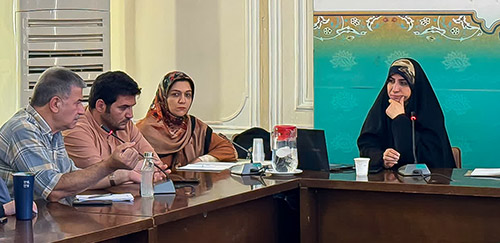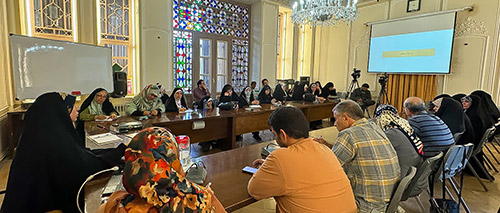Oral history interviewer should act like a white board
Compiled by: Maryam Assadi Jafari
Translated by: M.B. Khoshnevisan
2024-07-08
According to the website of Iranian Oral History, the 2nd meeting of “This Day: Oral History Meetings and Today” focusing on “Oral History and Audience Personality; Knowledge of Psychology and Necessity of Oral History Research” organized by the Art Center in Isfahan was held on Sunday 20th of Khordad 1403 (June 9, 2024) in the city’s House of Artists.
In the beginning of the meeting, Dr. Maryam Ghassemi, a psychologist and activist in the field of psychology, reviewed the position of interviewer and interviewee in oral history and said: "Oral history interview is used as a research method in many scientific fields. For example, in the discussion of psychology in the research model of phenomenology, a person's lived experience is recorded in the form of an interview and a series of psychological data is extracted from it. Now, as an oral history interviewer, you interview a person and extract a narrative. Oral history interview and interview in psychology have a lot in common from the psychological dimension. "Author's self-awareness" has an effect on the historiography model. If a situation or an event is expressed in oral history and the people present in that event and situation are still alive, it is possible to criticize, confirm or reject the narratives related to it. But imagine that many years have passed since this issue and a historian narrates undocumented narratives influenced by external factors. This is where the position of psychology is determined in the field of the interviewer and the interviewee."

Emphasizing the significance of “author’s self-awareness” and its impact on historiography, she continued, “Suspension in discussion is of great importance in phenomenology. That is, when I want to interview someone, I have to put my personality on hold before that. I have to enter the dialogue space like a white board and not involve my own point of view and opinion in order to direct the interview to the direction of my interest. When self-awareness and self-knowledge are done correctly, this stage can be reached so that there is no bias during the interview. If the writer and the interviewer are separate - which of course it is better not to be like this - then the bias of the writer dominates the previous bias. When we want to go for an interview, we have to put our mind in suspense. Suspension means putting myself behind the door and using the data as a tool in the interview. A question is raised here: “Should we have a hypothesis in advance?”. A hypothesis is something that has not been proven or disproved. As an oral history interviewer, I am allowed to have a “hypothesis” but not a "principle". When you have a principle in your mind, you just want to show everyone that this principle has credibility and evidence, and you constantly work with the interviewee's mind to give you what you want. For example, when you work on the lives of martyrs, you may hear stories from their childhood and adolescence, which you remove from the narration process because of the principle that martyrs are pure and holy in your mind. You just have to process the narrative and present it in the best possible way. You are not allowed to involve yourself in the narrative”.
In continuation of the meeting, Mrs. Maryam Ghassemi said that self-awareness requires practice, adding, “Listen to your own interviews every now and then to see if bias has happened due to lack of self-awareness or not. What should the author be self-aware of? Self-awareness means don't judge in the interview situation. Let's know our own values and beliefs and don't bring them into the interview. As psychologists, we constantly hear narratives in the treatment room. A psychotherapist must be careful to see all angles of the narrator during the counseling session and not involve his own needs in any way because the meeting belongs to the narrator. It is the same in the discussion of oral history. We only have to reflect the narration of the narrator. This does not mean that we go into the interview like an iron man. We are human and surely, we have feelings and ask our questions. But we must be aware that this sense helps clarify the narrative; not that we unconsciously or intentionally follow our inner desire. The main thing is to know the personality of the interviewer and the writer in two dimensions: one is to know the context of the character and the other is to know the problems of the character which are different from each other. The background of personality is healthy and most of it is genetic. That is, it is taken from the parents and the environment develops it. The next issue is our personality problems and flaws, in this field, there are many opinions about the type of personality”.
Shen then explained about the personality model of John Holland and its division to six types of "Realistic", "Investigative", "Artistic", "Social", "Enterprising", and "Conventional" and analyzed the psychological disorders of "narcissist", "theatrical", "avoidant" and "pessimist", and about the impacts of these issues in oral history interviews said, "Narcissists have one constant characteristic, and that is that they are sensitive to criticism. They get irritated by criticism and you will never hear them apologize and they seem extremely charismatic. Because they are constantly praising themselves. When facing a narcissist for an oral history interview, put your shield down and don't guard against him. Compliment him. Because you are not going to educate someone in the interview process. We do not educate anyone in the interview process. It is not a therapy session to give someone a solution. We are only responsible for recording the narratives.
People with theatrical disorder exaggerate their appearance and behavior, but they may also apologize when necessary. they are easy-going people to interview and communicate easily. Theatrical people talk a lot and may even deviate from the main course of the interview. But they can be returned to the dialogue routine. Narratives of theatrical and narcissistic people must be verified. You should not be satisfied with the words of narcissistic people. Because half of his information is either caused by internal emotions or projection.

People with avoidant disorder are not communicative. Avoidant people are not necessarily pessimistic and do not like to communicate with you for any reason. You must be selective and do not show yourself off in the interview session. Give them time to think. They pause in their conversation. You have to know where to be silent so that he starts talking. Do not ask general questions. Ask precise, correct and to-the-point questions. Avoidant people become extremely anxious and you should not let them get to this stage. You should be patient and have a structured interview with a mix of open and closed questions so that you don't just get short yes and no answers.
Pessimists are cautious and skeptical. For example, when you go to them for an interview, they always ask what these interviews are for and where they will be used. Because they are worried about its possible consequences. It is difficult to approach these people and you should avoid asking personal questions. They have delusions of conspiracy and worry about how these narratives will be used against them later. When interviewing people with avoidant and pessimistic disorders, you must constantly reassure them. Try to have the narrator walk away from the interview with a good memory, and that good memory happens strangely reassuringly and stays with you if you work with him. Providing security to the narrator is also important. For example, if he is worried about publishing his memoirs, assure him that you will only listen to the interviews yourself and that you will hand them over to him after finishing editing, and even if he does not agree to publish the narratives, you will not do. Don't talk to avoidant people too much. But there is nothing wrong with pessimists."
Regarding the significance of self-awareness for the interviewer, Dr. Ghasemi said, "The first step is to clarify the issue for yourself. The correct definition of the problem is important in all aspects of life. Sometimes our look is an attractive one. For example, when you go for an interview, you define a series of problems for yourself, the problems that you are responsible for solving, not the narrator! The interviewer says, it is not possible to talk to the other side at all or he does not talk at all. Then someone else goes and does the interview easily. Sometimes our problem is based on our personality. Suppose, I have realized that I have a narcissistic personality. Now one of my issues is, what should I do so that my narcissism does not appear in the interview session? The most important point in the interview is that the interviewee is the priority. We should avoid everything as much as we can. We are not going to win the relationship. Self-awareness helps you realize where your personality clashes with the interviewee. Before the interview, we conduct studies about the narrator and make a series of hypotheses. We must be careful not to continue the same line in the interview session and our questions should not confirm or reject our previous studies. Finally, be sure to do "mind building". That is, see the other person's mind, create and give him feedback. For example, you feel that the interviewee is tired. Tell him: I feel, I have made you tired and convey to him the feeling that I read your mind and feelings. So, if an interviewer wants to extract words from the other side, he must know "security", "reassurance" and "mind building".
Number of Visits: 1466
http://oral-history.ir/?page=post&id=11984
